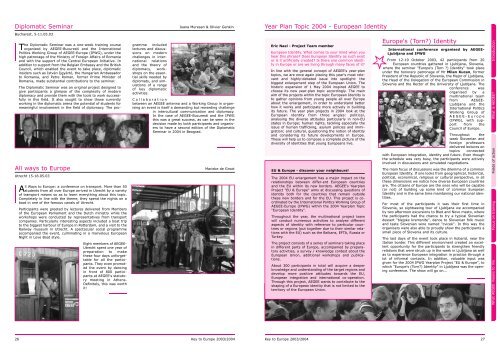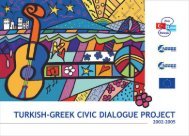Key 2003/2004 - AEGEE Europe
Key 2003/2004 - AEGEE Europe
Key 2003/2004 - AEGEE Europe
Create successful ePaper yourself
Turn your PDF publications into a flip-book with our unique Google optimized e-Paper software.
Diplomatic SeminarIoana Muresan & Olivier GenkinYear Plan Topic <strong>2004</strong> - <strong>Europe</strong>an IdentityBucharest, 5-11.05.03All ways to <strong>Europe</strong>Utrecht 15-18.05.03ll Ways to <strong>Europe</strong>: a conference on transport. More than 50Astudents from all over <strong>Europe</strong> arrived in Utrecht by a varietyof transport means so as to learn everything about this topic.Completely in line with the theme, they spend the nights on aboat in one of the famous canals of Utrecht.Participants were greeted by lectures delivered from Membersof the <strong>Europe</strong>an Parliament and the Dutch ministry while theworkshops were conducted by representatives from transportcompanies. Particularly interesting aspects included a boat tripto the biggest harbour of <strong>Europe</strong> in Rotterdam, and a visit to theRailway museum in Utrecht. A spectacular social programmeaccompanied the event, culminating in a marvelous <strong>Europe</strong>anNight in Love Boat style.Eight members of <strong>AEGEE</strong>-Utrecht spent one year ofpreparation to makethese four days unforgettablefor all the participants.They even promotedthe event by dancingin front of 800 participantsat <strong>AEGEE</strong>'s statutorymeeting in Athens.Definitely, this was worthit!he Diplomatic Seminar was a one-week training courseTorganized by <strong>AEGEE</strong>-Bucuresti and the InternationalPolitics Working Group of <strong>AEGEE</strong>-<strong>Europe</strong> (IPWG), under thehigh patronage of the Ministry of Foreign Affairs of Romaniaand with the support of the Central <strong>Europe</strong>an Initiative. Inaddition to support from the Belgian Embassy and the BritishCouncil, which enabled the event to take place, diplomaticinsiders such as István Ijgyártó, the Hungarian Ambassadorto Romania, and Petre Roman, former Prime Minister ofRomania, made substantial contributions to the seminar.The Diplomatic Seminar was an original project designed togive participants a glimpse of the complexity of moderndiplomacy and provide them with the tools to work successfullyin this field. It also sought to show those currentlyworking in the diplomatic arena the potential of students formeaningful involvement in the field of diplomacy. The programmeincludedlectures and discussionson modernchallenges in internationalrelationsand the theory ofdiplomacy, workshopson the essentialskills needed bydiplomats, and simulationsof a rangeof key diplomaticactivities.Collaborationbetween an <strong>AEGEE</strong> antenna and a Working Group in organisingan event is itself a demanding but rewarding challengein intercultural communication and diplomacy.In the case of <strong>AEGEE</strong>-Bucuresti and the IPWGthis was a great success, as can be seen in thedecision made by both participants and organisersto have a second edition of the DiplomaticSeminar in <strong>2004</strong> in Beograd.Marieke de GrootEric Nael - Project Team member<strong>Europe</strong>an Identity. What comes to your mind when youhear this phrase? Does <strong>Europe</strong>an Identity as such existor is it artificially created? Is there one common identityin <strong>Europe</strong> or are we living through many faces of it?In line with the general concept of <strong>AEGEE</strong>'s year-plantopics, we are once again placing this year's most relevantand highly-debated issue into spotlight: thebiggest enlargement step of the <strong>Europe</strong>an Union. Thehistoric expansion of 1 May <strong>2004</strong> inspired <strong>AEGEE</strong> tochoose its new year-plan topic accordingly. The mainaim of the projects within the topic <strong>Europe</strong>an Identity isto gather opinions from young people all over <strong>Europe</strong>about the enlargement, in order to understand betterhow it works and participate more actively in buildingits future. The year plan projects in <strong>2004</strong> look at the<strong>Europe</strong>an identity from three angles: political,analysing the diverse attitudes particularly in non-EUstates in <strong>Europe</strong>; human rights, tackling especially theissue of human trafficking, asylum policies and immigration;and cultural, questioning the notion of identityand considering its future developments in <strong>Europe</strong>.These will help us to compose a complete picture of thediversity of identities that young <strong>Europe</strong>ans live.EU & <strong>Europe</strong> - discover your neighbours!The <strong>2004</strong> EU enlargement has a major impact on therelationships between differ-ent <strong>Europe</strong>an countriesand the EU within its new borders. <strong>AEGEE</strong>'s YearplanProject "EU & <strong>Europe</strong>" aims at discussing questions ofidentity both for the countries that remain outsidethese new borders and for the EU. This project is coordinatedby the International Politics Working Group of<strong>AEGEE</strong>-<strong>Europe</strong> (IPWG) within the <strong>2004</strong> Yearplan Topic"<strong>Europe</strong>an Identity".Throughout the year, the multinational project teamwill conduct numerous activities to analyse differentaspects of identity with reference to particular countriesor regions (put together due to their similar relationswith the EU) such as the Balkans, EFTA, Russia orTurkey.The project consists of a series of seminars taking placein different parts of <strong>Europe</strong>, accompanied by preparatoryactivities, a survey / knowledge contest about the<strong>Europe</strong>an Union, additional workshops and publications.About 300 participants in total will acquire a deeperknowledge and understanding of the target regions anddevelop more positive attitudes towards the EU,<strong>Europe</strong>an integration and international co-operation.Through this project, <strong>AEGEE</strong> wants to contribute to theshaping of a <strong>Europe</strong>an identity that is not limited to theterritory of the <strong>Europe</strong>an Union.<strong>Europe</strong>'s (Torn?) IdentityInternational conference organised by <strong>AEGEE</strong>-Ljubljana and IPWGFrom 12-19 October <strong>2003</strong>, 42 participants from 20<strong>Europe</strong>an countries gathered in Ljubljana, Slovenia,where the seminar "<strong>Europe</strong>'s (Torn ?) Identity" took placeunder the honorary patronage of Mr Milan Kucan, formerPresident of the Republic of Slovenia, the Major of Ljubljana,the Head of the Delegation of the <strong>Europe</strong>an Commission inSlovenia and the Rector of the University of Ljubljana. Theconference wasorganised by amultinational teamfrom <strong>AEGEE</strong>-Ljubljana and theInternational PoliticsWorking Group of<strong>AEGEE</strong>-<strong>Europe</strong>(IPWG), with supportfrom theCouncil of <strong>Europe</strong>.Throughout theweek Slovenian andforeign professorsdelivered lectures ontopics connectedwith <strong>Europe</strong>an integration, identity and future. Even thoughthe schedule was very busy, the participants were activelyinvolved in discussions and simulated negotiations.The main focus of discussions was the dilemma of a common<strong>Europe</strong>an Identity. If one looks from geographical, historical,political, economical, religious or cultural perspective, in allthese dimensions we notice how diverse <strong>Europe</strong>an countriesare. The citizens of <strong>Europe</strong> are the ones who will be capable(or not) of building up some kind of common <strong>Europe</strong>anIdentity and in the same time maintaining our national identities.For most of the participants it was their first time inSlovenia, so sightseeing tour of Ljubljana we accompaniedby two afternoon excursions to Bled and Novo mesto, wherethe participants had the chance to try a typical Sloveniandessert "blejske kremsnite", dance to Slovenian folk musicand taste Slovenian wine named "cvicek". In this way theorganisers were also able to proudly show the participants asmall piece of Slovenia and its culture.The last days of the event took place in Kobarid, near theItalian border. This different environment created an excellentopportunity for the participants to strengthen friendlyrelations that were struck up in the week in Ljubljana as wellas to experience <strong>Europe</strong>an integration in practice through alot of informal contacts. In addition, valuable input wasgiven for the <strong>2004</strong> IPWG Yearplan Project "EU & <strong>Europe</strong>", towhich "<strong>Europe</strong>'s (Torn?) Identity" in Ljubljana was the openingconference. The show will go on...What <strong>AEGEE</strong> means to me Focus on training Fields of action What is <strong>AEGEE</strong>? Introduction26 <strong>Key</strong> to <strong>Europe</strong> <strong>2003</strong>/<strong>2004</strong> <strong>Key</strong> to <strong>Europe</strong> <strong>2003</strong>/<strong>2004</strong>27







